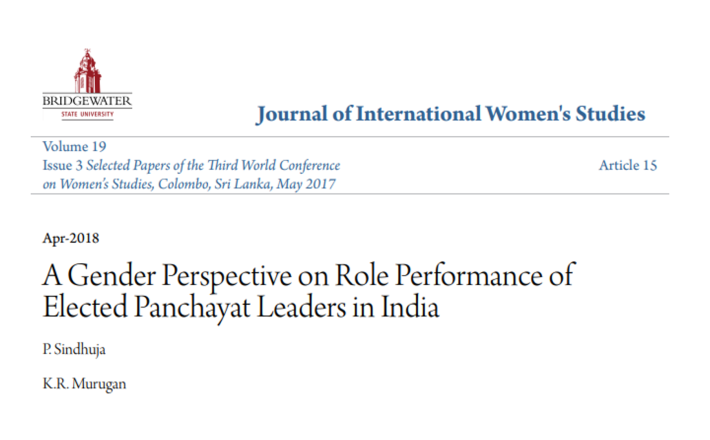A gender perspective on role performance of elected panchayat leaders in India
Source: Journal of International Women's Studies
Gender equality is fundamentally related to sustainable development, and globally accepted as a necessity for the promotion of human rights. Gender empowerment is determined by active participation of women and men in social, economic, and political spaces and activities taken in decision-making. In the context of local government, gender equality is critical as women and men face different challenges in full participation, representation and decent work opportunities. Though the constitution provides women the right to be elected in political and public representative institutions, such as parliament and local government bodies, gender inequality, as a collection of interlinked problems existed in the political arena too. Today the representation of women in politics has been increased considerably but due to their low participation, their issues and problems are generally unseen and unnoticed. Participation of women in the decision-making levels not only enhances their social, political and economic status, but also strengthens democratic institutions and even perhaps change the nature of the democratic process. Thus, the present study analyzed the gender challenges, gender influence in leadership styles, gender role and responsibilities of the elected panchayat leaders in Sivagangai district. The sample size of the study is 50 and the Harvard Analytical Framework has been used as a tool for data collection. Findings of the study assisted in the framing of strategies for the effective role performance of women in rural local governance and for the promotion of Gender Responsive Governance.
Click here to see the academic article.

Gender equality is fundamentally related to sustainable development, and globally accepted as a necessity for the promotion of human rights. Gender empowerment is determined by active participation of women and men in social, economic, and political spaces and activities taken in decision-making. In the context of local government, gender equality is critical as women and men face different challenges in full participation, representation and decent work opportunities. Though the constitution provides women the right to be elected in political and public representative institutions, such as parliament and local government bodies, gender inequality, as a collection of interlinked problems existed in the political arena too. Today the representation of women in politics has been increased considerably but due to their low participation, their issues and problems are generally unseen and unnoticed. Participation of women in the decision-making levels not only enhances their social, political and economic status, but also strengthens democratic institutions and even perhaps change the nature of the democratic process. Thus, the present study analyzed the gender challenges, gender influence in leadership styles, gender role and responsibilities of the elected panchayat leaders in Sivagangai district. The sample size of the study is 50 and the Harvard Analytical Framework has been used as a tool for data collection. Findings of the study assisted in the framing of strategies for the effective role performance of women in rural local governance and for the promotion of Gender Responsive Governance.
Click here to see the academic article.